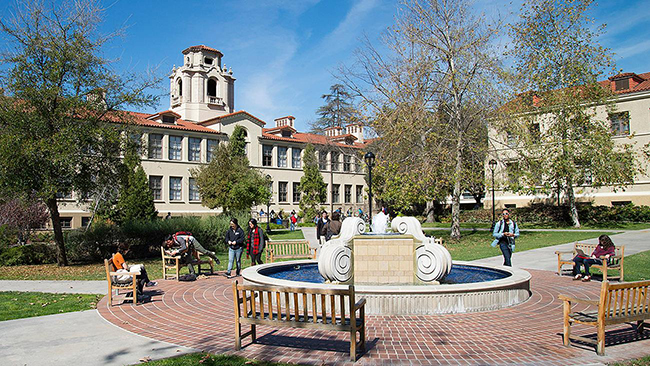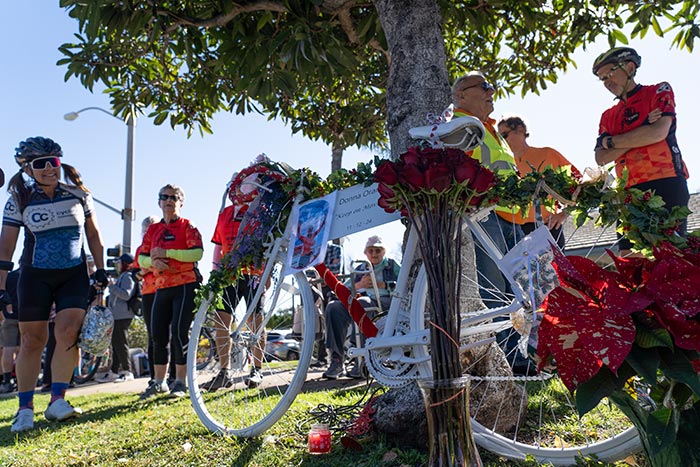Council candidates try to rise above the pack at forum
The candidates for Claremont City Council continue to make their case to the people as the March 7 election draws closer.
Seven of the eight declared candidates were on hand at the Alexander Hughes Center last week for the Thursday, February 16 Active Claremont candidates’ forum. The standing-room-only crowd in the Padua Room heard the candidates’ positions on topics ranging from public safety to the water trial to the relationship between the city and the Colleges.
The first question from the audience—relayed to the candidates by moderator and former city councilmember Jackie McHenry—struck right to the heart of an important issue. Do the candidates see any issues of conflict of interest related to their job?
Abraham Prattella, a real estate developer and part-time pastor, noted that his experience in real estate would actually “enhance my decision-making here in Claremont” and would not present a conflict of interest.
Zach Courser, a government professor at Claremont McKenna College, told the audience that he sees his job as “rather valuable” in developing a stronger relationship between the city and the colleges.
“Put yourself in my shoes—would you run to put your boss on the city council?” Mr. Courser said. “That’s certainly not my intention. My intention comes from a deep love and understanding of this community.”
The city’s quest to take over the water system once again was a topic, as Ms. McHenry combined three questions regarding the water trial for the candidates.
Councilmembers Larry Schroeder and Corey Calaycay—who are running for their third and fourth terms on council, respectively—defended the city’s pursuit of the system, which experienced a setback when a judge dismissed the city’s case in December following a 21-day bench trial.
“I’m still of the opinion that the judge held us to a much higher standard than the law required for acquiring the system,” Mr. Schroeder said.
Mr. Calaycay relayed his change of heart over the acquisition, noting he was against the takeover when he was first elected to council but reversed his position during the 2008 financial crisis, when Golden State Water Company (GSW) began issuing surcharges such as the WRAM (Water Revenue Adjustment Mechanism) to residents.
“It became clear they were using the water adjustment mechanism not only to make themselves whole and assure their guaranteed rate of return for people using less water,” he said. “They were also using it to basically reimburse themselves for natural losses in the downturn of the economy.”
Mr. Courser, who has been critical of the city’s approach to the trial, noted that Claremont is “obliged” to move forward with an appeal due to the costs incurred. But he took the incumbents to task over solely blaming the judge for the decision and refusing to look inward.
“I find it unpersuasive that the only person in this process who seemed to fail was the judge,” he said. “I think we kind of whistled past this, we expected it to be a slam-dunk. And to tell you the truth, when I voted for Measure W myself, I paused for a second and thought, are we up to this? Because this is a huge undertaking.”
Anthony Grynchal, a local realtor working under the trademarked moniker “Mr. Claremont,” once again brought up his “special water district,” a plan that he claims would “give us a shot at lowering the water bill.”
Michael Keenan noted that he has “been relentless” about the city’s efforts to acquire the water system, and called on the city to move even further and claim eminent domain over the electrical grid.
Another controversial topic was broached during the forum—the city’s recent resolution affirming its commitment to diversity and civil rights, a largely symbolic declaration many have incorrectly called a sanctuary city ordinance.
Mr. Calaycay was once again given the opportunity to defend his abstention on the resolution, noting his apprehension on placing his vote—and thereby the votes of all Claremont citizens—on a divisive agenda item.
“In this town, when we’ve got other issues like the water that we have to take on that can be controversial,” he said. “I don’t favor dividing our residents on other issues when I don’t have to, and when I don’t feel it’s appropriate to do so.”
Murray Monroe used his time to reaffirm his commitment to Claremont going all the way to become a sanctuary city.
“It’s real simple,” he said. “You don’t want anyone to feel alienated or targeted.”
Mr. Courser noted the city “fell short of the mark” in drafting a resolution that only reaffirmed the city’s existing practices, and said he would have voted for it if he were on the council. As to declaring Claremont a “sanctuary city,” he noted that a better way to serve undocumented Claremonters would be to inform them of their rights and lead them to legal services.
Mr. Prattella claimed to be the only candidate who opposes Claremont becoming a sanctuary city, due in part to the possibility of the city losing nearly $500,000 in federal funding for schools and public safety.

The upcoming Gold Line was also a topic that was hotly debated between Mr. Courser and the two incumbent candidates.
Mr. Schroeder called the bridge the city passed on in July 2016 “a Berlin Wall” between north and south Claremont, and Mr. Calaycay noted that an extra bond measure would have to be floated to fulfill the community’s expectations.
Mr. Courser countered that the city rushed in their decision and lamented the commissions’ lack of input in the decision-making process.
“They were asked in June to make a decision that needed to be made by February,” he said. “We [the Traffic and Transportation Commission] were not consulted.”
Public safety was another concern, with one question from the audience asking the candidates how much of a priority it was as property crimes continue to rise.
Mr. Prattella took a more personal approach to his answer; he relayed the crowd that his family’s cars have been broken into twice in the past three years. He called for a larger and more robust police force and commended the emerging efforts of the city’s “see something, say something” program.
Mr. Schroeder and Mr. Calaycay cautioned the crowd to look at crime statistics from a different perspective, noting the FBI has warned against using uniform crime reporting to compare cities.
“Some would like you to think crime is out of control in Claremont because the number of crimes reported is more than the crimes in La Verne, according to 2015 statistics,” Mr. Schroeder said. “When you index the number of crimes reported to the population, Claremont’s crime rate is lower than La Verne’s.”
Mr. Courser responded to the incumbents’ claims.
“Listening to the incumbents, particularly on the question of crime statistics—okay, maybe it’s not a perfect comparison—but crime has gone up in Claremont by almost 20 percent in a year,” he said. “I don’t find that acceptable and I wouldn’t make excuses for it.”
The election will take place on March 7.
—Matthew Bramlett
news@claremont-courier.com










0 Comments